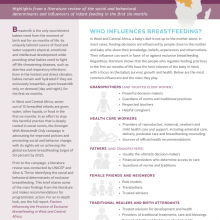Journal article
Oct 30 2023

Law matters – assessment of country-level code implementation and sales of breastmilk substitutes in South Asia (Ching C, Sethi V, et al. Frontiers in Public Health. 2023)
This study examines the status of implementation of the International Code of Marketing of Breast-milk Substitutes of eight countries in the South Asia region (Afghanistan, Bangladesh, Bhutan, India, Maldives, Nepal, Pakistan, and Sri Lanka), and describes the sales value and volume of commercial
Journal article
Oct 06 2022

“Stronger With Breastmilk Only” Initiative: Evaluation in Four Countries in West and Central Africa and at Regional level
The Stronger With Breastmilk Only initiative has successfully set or reset the agenda of governments and partners on the work on breastfeeding - but the process of implementing the initiative and all the strategies su
Journal article
Jul 16 2020

Stop Stunting in South Asia. Improving child feeding, women's nutrition and household sanitation
This overview paper summarizes and builds on papers from the Stop Stunting Conference of 2014, advocating to focus on child feeding, women's nutrition, and household sanitation as investment areas to prevent child stunting in South Asia.
Journal article
Feb 21 2020

Lessons from using cluster-randomized evaluations to build evidence on large-scale nutrition behavior change interventions (Menon, P., 2020. World Development)
Large-scale behavior change interventions, delivered through a variety of platforms – government health systems, community-based platforms, and mass media – had substantial impacts in Bangladesh, Ethiopia, and Vietnam.
Journal article
Jul 16 2017

Changes in the policy environment for infant and young child feeding in Vietnam, Bangladesh, and Ethiopia, and the role of targeted advocacy (Harris, J., 2011. BMC Public Health)
To fill a knowledge gap of how potential contribution of targeted advocacy can improve policy environments in low and middle-income countries, this study tracked changes in the policy environment over a four-year period in three countries and examined the role of targeted nutrition and IYCF advoc


